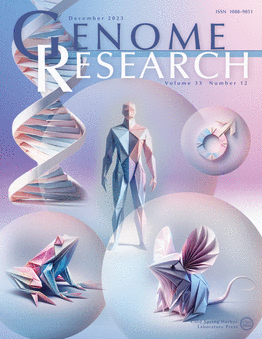带分裂器的多种单倍型的长读重建
IF 5.5
2区 生物学
Q1 BIOCHEMISTRY & MOLECULAR BIOLOGY
引用次数: 0
摘要
当对相似序列的混合物进行测序时,重建精确的单倍型是重要的。长读测序可以连接遥远的等位基因,以解开相似的单倍型,但处理测序错误需要专门的技术。我们提出了devider,一种从长读序列中对小序列(如病毒或基因)进行单倍型分析的算法。devider使用位置de Bruijn图,在信息等位基因的字母表上进行序列对图对齐,以提供与各种长读测序技术兼容的快速组装启发方法。在包含7个HIV菌株的合成纳米孔数据集上,分离器恢复了97%的单倍型内容,并且获得了最准确的丰度估计,而花费了4分钟和1gb内存来获得8000x的覆盖率。对合成抗微生物药物耐药性(AMR)基因混合物的基准测试表明,分离方法恢复了83%的单倍型,比次优方法高出23个百分点。在真实的PacBio和Nanopore数据集上,devider可以在几秒钟内概括出先前已知的结果,从而分离出包含10个菌株和HIV-1合并感染数据集的细菌群落。我们使用分裂器研究了富含AMR基因的长读牛肠道宏基因组在宿主内的多样性,发现了一个覆盖面积为18,000倍的tet(Q)四环素抗性基因的13个不同的单倍型和一个CfxA2 β -内酰胺酶基因的6个单倍型。我们发现了这些AMR基因单倍型的清晰重组块,展示了分裂者揭示异质混合物进化信号的能力。本文章由计算机程序翻译,如有差异,请以英文原文为准。
Long-read reconstruction of many diverse haplotypes with devider
Reconstructing exact haplotypes is important when sequencing a mixture of similar sequences. Long-read sequencing can connect distant alleles to disentangle similar haplotypes, but handling sequencing errors requires specialized techniques. We present devider, an algorithm for haplotyping small sequences - such as viruses or genes - from long-read sequencing. devider uses a positional de Bruijn graph with sequence-to-graph alignment on an alphabet of informative alleles to provide a fast assembly-inspired approach compatible with various long-read sequencing technologies. On a synthetic Nanopore dataset containing seven HIV strains, devider recovered 97% of the haplotype content and had the most accurate abundance estimates while taking < 4 minutes and 1 GB of memory for > 8000× coverage. Benchmarking on synthetic mixtures of antimicrobial resistance (AMR) genes showed that devider recovered 83% of haplotypes, 23 percentage points higher than the next best method. On real PacBio and Nanopore datasets, devider recapitulates previously known results in seconds, disentangling a bacterial community with > 10 strains and an HIV-1 co-infection dataset. We used devider to investigate the within-host diversity of a long-read bovine gut metagenome enriched for AMR genes, discovering 13 distinct haplotypes for a tet(Q) tetracycline resistance gene with > 18,000× coverage and 6 haplotypes for a CfxA2 beta-lactamase gene. We found clear recombination blocks for these AMR gene haplotypes, showcasing devider's ability to unveil evolutionary signals for heterogeneous mixtures.
求助全文
通过发布文献求助,成功后即可免费获取论文全文。
去求助
来源期刊

Genome research
生物-生化与分子生物学
CiteScore
12.40
自引率
1.40%
发文量
140
审稿时长
6 months
期刊介绍:
Launched in 1995, Genome Research is an international, continuously published, peer-reviewed journal that focuses on research that provides novel insights into the genome biology of all organisms, including advances in genomic medicine.
Among the topics considered by the journal are genome structure and function, comparative genomics, molecular evolution, genome-scale quantitative and population genetics, proteomics, epigenomics, and systems biology. The journal also features exciting gene discoveries and reports of cutting-edge computational biology and high-throughput methodologies.
New data in these areas are published as research papers, or methods and resource reports that provide novel information on technologies or tools that will be of interest to a broad readership. Complete data sets are presented electronically on the journal''s web site where appropriate. The journal also provides Reviews, Perspectives, and Insight/Outlook articles, which present commentary on the latest advances published both here and elsewhere, placing such progress in its broader biological context.
 求助内容:
求助内容: 应助结果提醒方式:
应助结果提醒方式:


